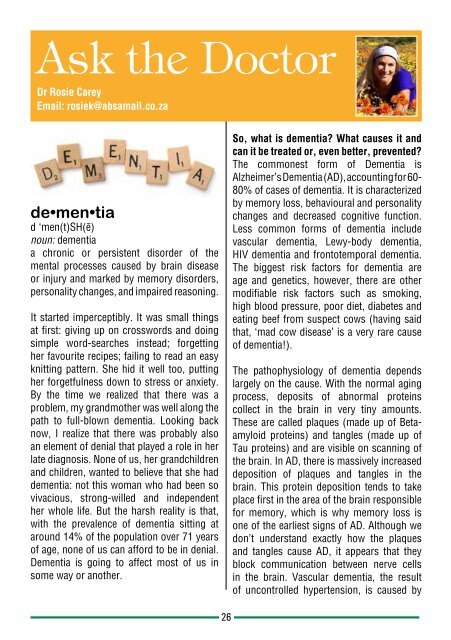Bush T May16
You also want an ePaper? Increase the reach of your titles
YUMPU automatically turns print PDFs into web optimized ePapers that Google loves.
Ask the Doctor<br />
Dr Rosie Carey<br />
Email: rosiek@absamail.co.za<br />
de•men•tia<br />
d ‘men(t)SH(ē)<br />
noun: dementia<br />
a chronic or persistent disorder of the<br />
mental processes caused by brain disease<br />
or injury and marked by memory disorders,<br />
personality changes, and impaired reasoning.<br />
It started imperceptibly. It was small things<br />
at first: giving up on crosswords and doing<br />
simple word-searches instead; forgetting<br />
her favourite recipes; failing to read an easy<br />
knitting pattern. She hid it well too, putting<br />
her forgetfulness down to stress or anxiety.<br />
By the time we realized that there was a<br />
problem, my grandmother was well along the<br />
path to full-blown dementia. Looking back<br />
now, I realize that there was probably also<br />
an element of denial that played a role in her<br />
late diagnosis. None of us, her grandchildren<br />
and children, wanted to believe that she had<br />
dementia: not this woman who had been so<br />
vivacious, strong-willed and independent<br />
her whole life. But the harsh reality is that,<br />
with the prevalence of dementia sitting at<br />
around 14% of the population over 71 years<br />
of age, none of us can afford to be in denial.<br />
Dementia is going to affect most of us in<br />
some way or another.<br />
So, what is dementia? What causes it and<br />
can it be treated or, even better, prevented?<br />
The commonest form of Dementia is<br />
Alzheimer’s Dementia (AD), accounting for 60-<br />
80% of cases of dementia. It is characterized<br />
by memory loss, behavioural and personality<br />
changes and decreased cognitive function.<br />
Less common forms of dementia include<br />
vascular dementia, Lewy-body dementia,<br />
HIV dementia and frontotemporal dementia.<br />
The biggest risk factors for dementia are<br />
age and genetics, however, there are other<br />
modifiable risk factors such as smoking,<br />
high blood pressure, poor diet, diabetes and<br />
eating beef from suspect cows (having said<br />
that, ‘mad cow disease’ is a very rare cause<br />
of dementia!).<br />
The pathophysiology of dementia depends<br />
largely on the cause. With the normal aging<br />
process, deposits of abnormal proteins<br />
collect in the brain in very tiny amounts.<br />
These are called plaques (made up of Betaamyloid<br />
proteins) and tangles (made up of<br />
Tau proteins) and are visible on scanning of<br />
the brain. In AD, there is massively increased<br />
deposition of plaques and tangles in the<br />
brain. This protein deposition tends to take<br />
place first in the area of the brain responsible<br />
for memory, which is why memory loss is<br />
one of the earliest signs of AD. Although we<br />
don’t understand exactly how the plaques<br />
and tangles cause AD, it appears that they<br />
block communication between nerve cells<br />
in the brain. Vascular dementia, the result<br />
of uncontrolled hypertension, is caused by<br />
26




